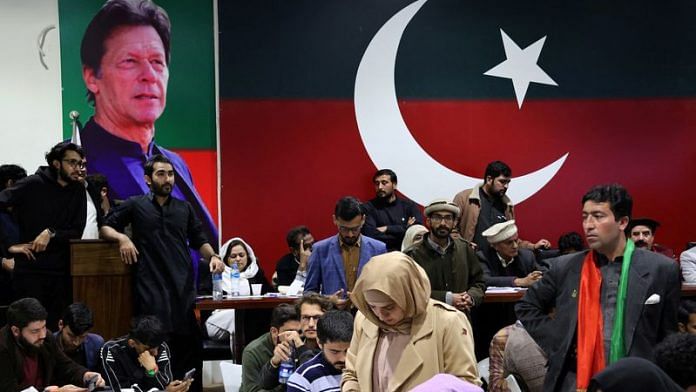After nearly two days of counting of votes in the general elections held on 8 February, Pakistan has a hung parliament with no party getting a clear majority of 134 seats in the 266-member National Assembly. While independent candidates supported by Imran Khan’s PTI lead the tally with close to 100 seats, the other two mainstream parties—Nawaz Sharif’s PML-N and Bhutto-Zardari’s PPP. But even as the PTI was beginning to celebrate its victory, Sharif thanked people for supporting him. Interestingly, he has urged other parties—including PTI-backed independents who contested under various electoral symbols since the ‘cricket bat’ was frozen by the Election Commission—to join him in “taking the injured Pakistan out of crisis.” Beyond the failed economy, Pakistan is now staring at unprecedented political instability.
Nawaz Sharif’s call for political consensus is a sure sign of the army trying to wriggle out of the crisis that is far beyond its comprehension and resolution. The army, the usual suspect in derailing democracy in Pakistan, has its game plan well-drawn in its war room. It would either resort to threats and manipulation to install Nawaz as PM or let PML-N, PPP and others hash out a coalition. The army has several compulsions this time. After unseating Nawaz Sharif in 2018, it had a tough time finding a pawn as an alternative to fill the post of prime minister. After the Musharraf experiment, the army appears to be uncomfortable occupying the political throne, subject to strict scrutiny domestically and globally. The US, EU, and the democratic West are comfortable dealing with the army adorned with the fig leaf of democratic dispensation in Islamabad. Having understood this ironic reality and duplicity of the West, the generals in olive fatigues do two things mechanically; holding regular elections and finding a puppet to do their bidding.
In 2014 Nawaz Sharif was propped by the army as their trusted proxy in power. Nawaz promised to be friendly with India, and the civil society believed him. But it was when he began taking his promises seriously that the army decided to stop him in his tracks. For the powerful coterie in the army HQ in Islamabad, friendship between India and Pakistan would render them permanently unemployed (and unemployable, if it may please a certain Congress leader). The fear of India and New Delhi’s prowess has to be kept simmering. The Western capitals need to be informed of the necessity to arm Pakistan against terrorism and ‘enemy on the East’. Drumming up an anti-India rhetoric is germane to its survival.
This time too, after a decade, the army once again brought out Nawaz from the dog house and facilitated his election win by demonising Imran Khan, once their alternative for Nawaz. From the cool comforts of the Prime Minister’s Office, Khan’s fortunes descended to a dingy cell in Adiala Jail, convicted in four cases and sentenced to jail for 34 years just a week before the general elections. He is also being framed as the brain behind vandalising military establishments including the Lahore Corps Commander’s House (Jinnah House), the army headquarters in Rawalpindi, Mianwali Airbase, and the ISI building in Faisalabad last May. Implicating Imran Khan in attacks on army establishments will facilitate the military to bring him under the draconian provisions of the infamous Army Act where attacks on the army are equal to waging war on the country, punishable by the death penalty.
Also read: Pakistan election may finally go to Nawaz Sharif. But Imran Khan supporters have killed his joy
Possible catastrophe lies ahead
Many of Imran Khan’s party office bearers have reportedly been intimidated by the army to refrain from political activities. But they strategically contested as independents and performed remarkably well by establishing a clear lead in the first few hours of vote counting. With the sudden setback these candidates face and the surprise surge of PML-N seats, a hung parliament is not going to be an easy one to control, much less function to “take the injured Pakistan out of crisis.”
The $3 billion dollar bailout from the IMF will end in March, requiring a new bailout schemes and reforms leading to further tax hikes and unpopular economic decisions by the new government. Pakistan, facing multiple crisis, could soon descend into much greater catastrophe leading to further political and economic instability, street fights between followers of political opponents, and, worse still, the army stepping in as a jury to assert its power. Every time political leaders have established their supremacy, relegating the army to a secondary position, the army has hit back, especially after the 1971 elections, which gave a decisive victory to Sheikh Mujibur Rehman.
New Delhi must wait for the political establishment of “naya Pakistan” to settle down but not harbour hopes of improvement or normalisation in relations. There is little chance of the army letting the terrorists take a back seat. But for a change, the army appears to be getting a taste of its own medicine. Terror outfits supported by the army and the ISI, euphemistically called non-state actors, and Tehreek-e-Taliban Pakistan (TTP) camps have come under severe attack by Iran. The woeful economic condition does not allow Islamabad to shelter against attacks, much less retaliate. The Taliban-ruled Afghanistan has taken a serious view of TTP camps operating out of the Afghanistan-Pakistan border inside Afghanistan. Attacks on the army in Balochistan have increased.
The new prime minister has his plate full and needs to attend to economic stability before worrying about political stability, which anyway is in the hands of the army. His job is cut out, that of wearing a democratic hat and going around the world seeking financial aid. India can only watch the situation but keep the powder dry in the meantime.
Seshadri Chari is the former editor of ‘Organiser’. He tweets @seshadrichari. Views are personal.
(Edited by Prashant)



